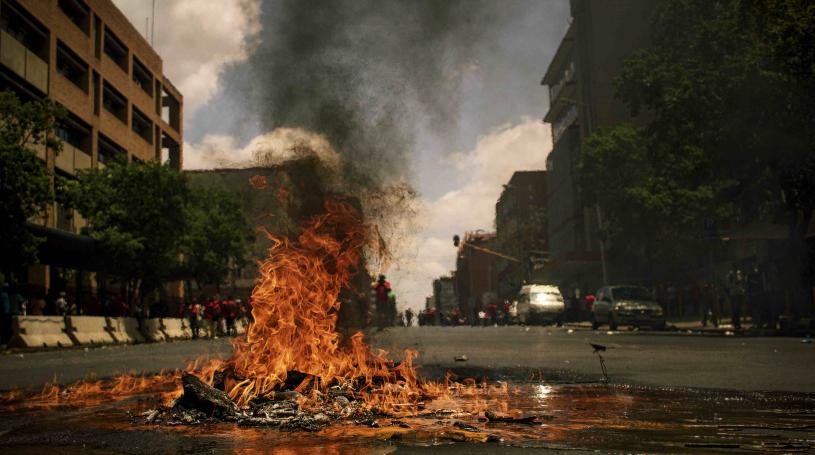The taxi strike is detrimental, regretful and avoidable
The taxi strike is detrimental, regretful and avoidable, at the outset we want to make it clear that the Chamber condemns violence, lawlessness and damage to property.
The questions to ask is, how did we get to this?
The issue is complex and multi-faceted, and we urge the public not to jump to conclusions. In seeking a solution to the crisis we all need to ask ourselves a few key questions:
a. Who actually gains from this mess?
b. Who are the perpetrators of the incidents of violence? Can the perpetrators be identified and isolated with real evidence?
c. Will violence help SANTACO’s credibility?
d. Who benefits from spreading fake news regarding the standoff? Whose interests does it serve or is it about fomenting social instability?
e. When all this is over, who are the winners?
In our opinion, almost nobody gains from the current situation. Not SANTACO, nor Government, nor business, nor the citizenry.
What we can all agree on is the need for safe and affordable transport to get to work. Our businesses and their staff keep the economy going. The economy needs to keep going to put money in the pockets of citizens and get food on the table.
Sadly this is not happening today.
Golden Arrow Bus Services and the MYCITI bus services are trying to operate as best they can. The damage to their vehicles is completely unacceptable. The people responsible should be held fully accountable and made an example of. The overall economic consequences are devastating for our citizens and business owners.
The public also needs to appreciate the vital service that is the taxi industry in the context of South Africa’s constrained public transport system. Whilst the public sector worldwide prioritises provision of affordable transport solutions to the poor, the taxi industry has filled the gap in South Africa. The sector currently carries about 70 - 75% of our citizens to work, thereby fulfilling an essential service, one that is not subsidised like rail- and bus- services.
What caused the strike?
What we know is that taxi businesses are buckling due to various economic pressures – e.g. higher fuel costs, higher interest rate on leases. The impoundment of vehicles was the last straw for taxi owners.
When a driver is deemed to transgress a law, the taxi owner’s vehicle is now impounded. The impoundment of the vehicles destroys the business viability, as there is then no income to the business and yet the vehicle’s monthly hire purchase/lease installments need to be paid.
What causes taxi driver transgressions? Why do they drive poorly? Can that be fixed? Yes it can. UBER is a prime example.
The reality is our citizens and businesses depend on taxis transport working better, but the current taxi solution is not ideal and has many challenges. It needs a solution in the same way UBER managed to reign in its drivers.
Poor driving and law transgressions are not condoned in any way and needs to be rectified.
Law and order is a non-negotiable requirement for an improving society.
Partly this is essential to ensure passenger safety. All involved would benefit from sector reform.
What many don’t realise is that taxi drivers must pay a fixed daily fee to taxi owners. Drivers therefore try make as many trips as they can to maximise their profit. This causes them to drive faster, overtake, and transgress laws.
In so doing they may damage the taxi or cause it to be impounded. They increase wear and tear leading to higher cost of maintenance.
Taxi owners therefore do not want bad drivers.
Herein is the shared goal that should lead to a harmonious future. Better drivers, safer taxis, lower costs.
The limited ability by taxi owners to track and control bad behaviour, and to transform it into good behaviour, is a technical and business problem that already has solutions. UBER has done this, BOLT and others.
As a Chamber we believe herein lies an opportunity for Department of Mobility, with support from the DTIC – to address the systemic problem. The benefit thereof is not only for taxis and the 75% of citizens and businesses that rely on them, but also for the entire economy. The tax reward from this will easily pay back such investment from government.
The Cape Chamber therefore calls on all stakeholders to:
a. Recognise the taxi industry is key to our current mobility solution.
b. Recognise that the industry needs to work better and operate within the law
c. Appreciate that the industry cannot make these changes alone, and that it needs public sector support.
d. Calm down and engage in constructive dialogue to resolve differences.
We also wish to commend the Premier, Minister of Mobility, Mayor and their respective teams, as well as the leaders of SANTACO, for continuing to engage in dialogue over the past few days, to resolve the differences in a manner that is in the best interest of our citizens.
Derryn Brigg
Deputy President of the Cape Chamber of Commerce & Industry

